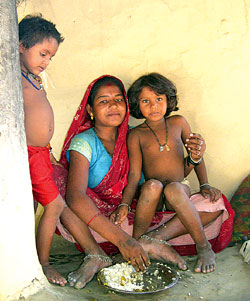|
|
| OUTSIDERS: Jhabadi Debi Sada can barely feed or clothe her children. |
Jhabadi Debi Sada from Haripur in Saptari district works every day from 7AM to 6PM in her landlord's fields, as does her husband. For their efforts, they get nine kilos of paddy a month. Jhabadi Debi's husband sells some of the paddy to buy rice, salt, and oil. When we meet her, she's returned from another day of backbreaking work to care for her five children.
"I've never seen more than Rs 50 in my life, and we almost never have enough to eat," says Jhabadi Debi, who knows she was married at 12, but has lost count of the years since.
You hear the same story in every one of the 35 Musahar households you go to in Chakdaha, Haripur.
In the hotbed of tarai ethnic politics, mainstream madhesi rights activists, anti-hillspeople vigilantes, Maoist splinter groups and Tharu groups are demanding everything from greater autonomy to secession. But Madhesi dalits are nowhere in the equation.
In east Nepal there are hundreds of communities like this one in Chakdaha. In Siraha and Saptari alone over 225,000 dalits live in dire poverty. The local Saraswati Community Development Forum, which works in five districts in Saptari, says that 85 percent of the dalit community in the area do not have enough to eat all year long. They also do not have citizenship certificates.
|
|
| Sita Mallik is out of the landlord-dalit trap and works as a sweeper in a Dhankuta hospital. But when it comes to the village pond and teashop, she\'s still an outcaste. |
They sell the paddy they get from the landowner at Rs 7-12, but must buy rice for as much as Rs 24 a kilo. Vegetables are unaffordable and to stretch the rice they make it into a thin gruel with a little salt and green chilli. On lucky days they have boiled pumpkin, but they have less and less land from the landlords to grow vegetables.
They are not kamaiyas, but the cycle of poverty and patronage they are caught in makes the situation of Madhesi dalits little better than that of bonded labour. Landowners still give away workers to each other in dowry or when they formalise friendship. Parau Saud's family was brought to Haripur two generations ago when a landlord here tied a bond of friendship with a landowner from another village.
"Our landlord didn't have enough labourers, so his friend sent 12 families to work here. That's how this settlement was established in Chakdaha," explains Saud.
Haripur's Musaharas are subject to all the usual strictures against dalits, but here even the school teachers taunt their children. If they actually get to school-dalit children are entitled to an annual Rs 250 government scholarship, but for many families the paperwork to claim this money is daunting. And the money is nowhere near enough for clothes, books, and school supplies. Jhabadi Debi gestures to her children, who are running around naked and says, "Sure, we admitted them to school, but where's the money to buy them pencils?"
The Musahar community is preparing for its biggest annual festival, Dinabadri, by going around neighbouring villages, banging their drums and begging for food. For a community that lives, barely, on the edges of a society in upheaval, that's the only option.




